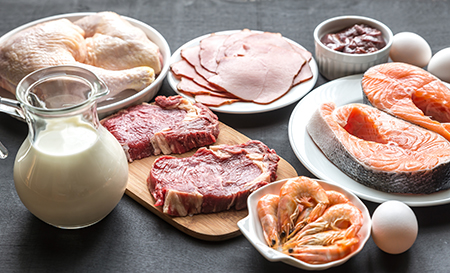Pure, strong vitamin K2 dissolved in olive oil
- Pure vitamin K2 (Menaquinone MK-7) dissolved in cold pressed olive oil
- 100% Recommended Daily Allowance
- Supports maintenance of normal bones and normal blood coagulation
- Small, soft gelatin capsules, easy to swallow
- Manufactured under pharmaceutical control
K-Pearls
| One capsule contains: | NRV* | ||
|---|---|---|---|
| Vitamin K2 | 75 µg | 100% |
* Nutrient Reference value.
Product Facts
Dosage:
1 capsule per day for adults and children 11 years and older. The capsule can be chewed or swallowed whole.
Do not exceed recommended amount.
Dietary supplements should not be used as a substitute for a varied diet or healthy lifestyle.
Pregnant and lactating women and those on medication should seek professional advice prior to taking supplements.
Ingredients:
Bulking agent: Olive oil
Capsule shell: Bovine gelatin
Humectant: Glycerol, purified water.
Vitamin K2 (Menaquinone MK-7).
Colour: Iron oxide
Storage:
Store at room temperature.
Keep out of the reach of children.
Contains: 60 capsules = 11 g
What are K-Pearls?
 K-Pearls are small, soft gelatin capsules with 75 μg of pure vitamin K2 (Menaquinon MK-7) in each capsule. The vitamin K2 is dissolved in cold-pressed olive oil to improve the absorption. The capsule size makes them easy to swallow, but they can also be chewed. Take K-Pearls with a meal.
K-Pearls are small, soft gelatin capsules with 75 μg of pure vitamin K2 (Menaquinon MK-7) in each capsule. The vitamin K2 is dissolved in cold-pressed olive oil to improve the absorption. The capsule size makes them easy to swallow, but they can also be chewed. Take K-Pearls with a meal.
All-Trans MK-7
In nature, vitamin K is found both in a trans and cis form that relates to the spatial structure of the molecule. It is only the trans form of MK-7, which is biologically active, whereas the cis form has no biological activity. K-Pearls is an all-trans form, making it biologically more active.
What is vitamin K?
Vitamin K belongs to the group of fat-soluble vitamins together with vitamins A, D and E.
The vitamin K was discovered by the Danish biochemist Henrik Dam in 1929, which later brought him a Nobel Prize. The vitamin was given the name vitamin K, where K stands for coagulation, (in German and Danish: Koagulation) which is the blood's important ability to clot and how long it takes. Later it became apparent that there are two main types of vitamin K: Phylloquinone (K1) and menaquinone (K2). In addition, there is a synthetic version of vitamin K, Menadione (K3), which is normally not used in dietary supplements.
Vitamin K2 is found in various forms from MK-4 to MK-14. Mk-10 and above, however, rarely occurs. The MK number refers to the length of the vitamin K side chain of so-called isoprene units. In dietary supplements usually only MK-7 and MK-4 are used.

Why vitamin K2 MK-7?
As vitamin K2 MK-7 stays longer in the body than both vitamin K1 and also vitamin K2 MK-4, the MK-7 version is considered more effective. Both K1 and K2 MK-4 are metabolized and excreted rapidly in the body, and we have only a small amount of vitamin K in the liver, spleen and lungs.
Vitamin K and bones
Vitamin K2 is particularly important for the distribution of calcium to our bone tissue. Our bone tissue is broken down and built up all the time. Whether it is the breakdown or build up of bone tissue dominating the bones depends on our age, activity level and nutrition. It is especially vitamin K2 that takes part in the transport of calcium into the bone tissue. The bone-forming cells are called osteoblasts. They produce a protein called osteocalcin activated by vitamin K, thus helping to take calcium from the blood and blood vessels and bind it into the bone tissue, thereby supporting the normal bone function.
Vitamin K and coagulation
Vitamin K is also a necessary factor in the complicated coagulation process. Vitamin K is necessary for the formation of prothrombin and various coagulation factors called Factors VII, IX and X.
Good sources of vitamin K2 from the diet
 Vitamin K1 is found in plants and especially in avocado, broccoli, cabbage, spinach and green beans.
Vitamin K1 is found in plants and especially in avocado, broccoli, cabbage, spinach and green beans.
In the diet, vitamin K2 is predominantly found in animal food, that is, in meat, liver, eggs, dairy products, but also in fermented soy products, cheese and sauerkraut.
In animal food, the content of vitamin K2 is predominantly MK-4, whereas bacteria predominantly produce the MK-7 form.
Vitamin K and intestinal bacteria
Fruits and vegetables that nourish the bowel's benign bacteria predominantly contains vitamin K1 versus vitamin K2. However, these intestinal bacteria produce a little vitamin K2, although the amount is insufficient to cover the body's needs. A fiber-rich diet benefits the body's benign bacteria.
Official claims
The EU Food Safety Agency (EFSA) has evaluated the evidence behind the product's content of vitamin K and has acknowledged the following statements:
- Contributes to the maintenance of normal bones
- Contributes to normal blood clotting



 Bio-Fiber
Bio-Fiber